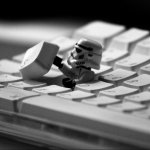|
sincx posted:There's a good chance this will lead to World War III with China. Or at the very least, an almost complete cessation of diplomatic and economic ties between the US and China. China hates Kim III as much as anyone else, but there's no way it'll tolerate an US attack on a nominal ally 50 miles from its border. China could be the 'unknown party'.
|
|
|
|

|
| # ? Jun 7, 2024 01:19 |
|
sincx posted:Have you heard of the Korean War? Juffo-Wup posted:Was there a specific section, or claim, that you take issue with? Or just the general tone? It seems from the write up that the US is the antagonist of the story for North Korea. Not a situation where poor policy, misreading of others' motives and political goals can effect both sides.
|
|
|
|
Juffo-Wup posted:Was there a specific section, or claim, that you take issue with? Or just the general tone? Honestly I was thinking something very similar, I was going to call it out after the first post but was too busy. What you wrote was actually the standard line of the South Korean left for awhile and in some ways still is but as time has gone on that line has fallen apart. This is due to things like the general agreement these days that North Korea was continuing to enrich plutonium in spite of the agreed framework, the total failure of the Sunshine Policy to open the north at all and how they deliberately sabotaged AFII after getting what they wanted out of it. Not to mention the fact that while things were bad beyond the North's control for a time in the nineties this is no longer true and there is no big rush for power. They have the money to either buy coal plants from elsewhere (and supply them with their own coal) or purchase power directly from China, they just choose not to because they would rather spend it on other things.
|
|
|
|
Budzilla posted:It seems from the write up that the US is the antagonist of the story for North Korea. Not a situation where poor policy, misreading of others' motives and political goals can effect both sides. It seems to me that that's precisely the point; the US is the antagonist of the story for North Korea. The misreading of others' motives and political goals is not a strictly American failing. But as many of the people reading the essay are Americans, or are at the least in a position to be familiar with American policies, it would belabor the point to say "here's how the poo poo the DPRK did looked to the US;" we know how it looked, we were there. The goal of presenting the flipside to that discussion, how the poo poo the US did looked to the DPRK, seems fairly reasonable to me, if only as a reminder that the rest of the world does not necessarily operate with perfect knowledge and understanding of US politics, policies, goals, and interests. EDIT: I should add, I don't think that makes criticism of the tone incorrect; I just think that that sort of tone can be instructive as long as its biases are made explicit.
|
|
|
DivineCoffeeBinge posted:It seems to me that that's precisely the point; the US is the antagonist of the story for North Korea. The misreading of others' motives and political goals is not a strictly American failing. But as many of the people reading the essay are Americans, or are at the least in a position to be familiar with American policies, it would belabor the point to say "here's how the poo poo the DPRK did looked to the US;" we know how it looked, we were there. The goal of presenting the flipside to that discussion, how the poo poo the US did looked to the DPRK, seems fairly reasonable to me, if only as a reminder that the rest of the world does not necessarily operate with perfect knowledge and understanding of US politics, policies, goals, and interests. It's not just the tone; even humoring the idea that DPRK was seeking nuclear weapons the entire time seems divorced from what we know to be the case.
|
|
|
|
|
Cliff Racer posted:Honestly I was thinking something very similar, I was going to call it out after the first post but was too busy. What you wrote was actually the standard line of the South Korean left for awhile and in some ways still is but as time has gone on that line has fallen apart. This is due to things like the general agreement these days that North Korea was continuing to enrich plutonium in spite of the agreed framework, the total failure of the Sunshine Policy to open the north at all and how they deliberately sabotaged AFII after getting what they wanted out of it. Not to mention the fact that while things were bad beyond the North's control for a time in the nineties this is no longer true and there is no big rush for power. They have the money to either buy coal plants from elsewhere (and supply them with their own coal) or purchase power directly from China, they just choose not to because they would rather spend it on other things. As I understand it North Korea wasn't enriching plutonium after Agreed. There was evidence that it was enriching uranium, which may or may not have been a violation of the framework. If North Korea was enriching LEU as reactor fuel, no. If it was enriching HEU, then yes (which would have been the claim the laid out by Washington in late 2002). From what I can tell the academic consensus runs into a good deal of controversy over this particular point, and while I'm personally ambivalent on the issue I do suspect that the Kim regime certainly wanted to stockpile small HEU, but it seems doubtful as to whether they had the infrastructure to do so. IMO whether or not the DPRK was trying to cheat on the Agreed Framework is somewhat secondary to the fact that the handling of this situation was botched. First was the Bush Administration moving forward with too little evidence at the time... something that we know he had done with Iraq and also something that he fell under suspicion of doing with North Korea by 2005. Second is his hardline approach. Even if North Korea was cheating with a clandestine HEU-based weapons program, with more delicate handling the stipulations of the Agreed Framework could have been used to get North Korea to halt its processing. Hard crackdowns and ultimatums only escalated tensions and made a skittish DPRK suddenly spin up its plutonium processing again. Analysts have argued that it would've taken 2-3 years for the DPRK to process enough HEU to make a bomb, whereas plutonium processing would've taken 6 months. If we suppose that North Korea does want to enrich nuclear fuel for weapons, it's probably best to not piss them off so they switch back to uranium, moving up the timetable for everyone then. Robert Galluci was the Chief US Negotiator with North Korea in the early 90s (and who believes they were in violation of Agreed with their uranium enrichment program), and here's what he had to say: Those who criticize the deal because they cheated on it, I think, are not understanding the nature of international politics. We have done deals with people who we expected might well cheat. Indeed, the Soviet Union cheated on all kinds of deals -- massively, in the biological weapons convention. That's probably the most famous. So, you look at the deal and say, "OK. What can you monitor? What can you watch? What can you verify? If they cheat, will you catch them? And if you don't catch them, are you still better off with the deal than without it?" The lesson is we stopped the plutonium program, and we had to watch for the enrichment program. You couldn't expect to have high confidence the North Koreans wouldn't cheat, based upon their past experience, and based upon how easy it is to have a secret centrifuge program. You had to understand that might happen, and still regard the deal as a good deal, in our interest, because over time, we'd be better off with the deal than without it. It wasn't perfect. It didn't provide for absolute transparency in North Korea. The hope, the expectation was, over time, relationships would improve. Tensions would reduce. We could get more access. And indeed, in the meantime, we stopped the plutonium program. We also had to monitor them as closely as we could through our intelligence capability, and try to catch them. Well, we did, and we did. The question for this administration is, what do you do now? Do you say, "Wait a minute. They're a rogue regime. You can't talk to them?" I wouldn't think that would be the best answer. http://www.pbs.org/wgbh/pages/frontline/shows/kim/interviews/gallucci.html ShadowCatboy fucked around with this message at 09:29 on Apr 24, 2016 |
|
|
|
The United States has enough obnoxious client states already, it don't need one which acts like one of the worst countries in the world while at the same time talking about how capitalism and the United States is the root of all evil. Thankfully everyone else in government agrees with me there and thus the point of the agreement was not to have good relations with North Korea (impossible, as North Korea needs an external enemy and its not going to be China,) it was to prevent the spread of nuclear weapons. Not only was it failing in regards to the North Korean program, it was failing in the sense that North Korea had become an exporter of the technology as well. Syria, at least, was relying on North Korean help in the construction of its own program. Robert Galucci says that everybody cheats? Well maybe so, but not in regards to nuclear weapons, either you have them or you don't. The North had as its interest the acquisition of nuclear weapons and it was going to get them, it moved forward consistently and deliberately to get them and by the time the framework did fail it had gotten everything together that it needed to get them. I mean are we supposed to believe that North Korea ratcheted a bomb together in three years after dismantling everything as per the agreement? That is an unreasonable timetable, look how long it has been taking Iran, look how long it took the Indians and Pakistanis. Of course those are both quibling over details, the real problem is this- the way you write, the United States is the only player in this game with animus, but that is not true. North Korean proliferation of weapons is a big deal, big enough that it would take more than just American annoyance and concern to stop it. You want to know why all this failed? Because the South spent ten years giving North Korea subsidies while receiving nothing in return, because the Chinese allow North Korean shell companies and shady banks to violate sanctions with impunity, because the Russians view it as a minor issue to be meddled with based on how they are feeling in other areas, because North Korea itself was not interested in building a vibrant and productive economy. Has the United States always played its hand well? But has it contributed more to this current situation than China or even South Korea? No and it is certainly less responsible for it than the North itself is.
|
|
|
|
It seems like the crux of the issue is whether North Korea was actively pursuing nuclear weapons in violation of the Agreed Framework between '97 and '02. Is there any evidence for this either way?
|
|
|
Cliff Racer posted:Robert Galucci says that everybody cheats? Well maybe so, but not in regards to nuclear weapons, either you have them or you don't. Like Israel, right? Exactly how many nuclear-armed countries waited until they had their weapons in hand before announcing that they had a nuclear project?
|
|
|
|
|
I don't like Israel so feel free to ignore my avatar. Though, on that matter, Israel has both never joined the NPT AND never officially declared that it acquired nuclear weapons, though everyone knows that they have. In that regard Israel (along with India and Pakistan) aren't actually breaking the rules as much as they are refusing to sign up to a rule that everyone else did. North Korea has signed up to the NPT and it has declared itself a nuclear state. Its also debatable whether Israel tested them or not as the Vela incident is still shrouded in secrecy. The difference is that I think everyone can trust Israel to build a working bomb, North Korea, not so much. As to countries waiting until they had a bomb, surprisingly a decent amount announced beforehand, especially early on. Others did not, Israel, which I just discussed, comes to mind but Pakistan went that route too if I remember correctly.
|
|
|
|
IIRC, the US has had to quietly intervene to put a stop to a clandestine South Korean nuclear program at least twice, so there's that. As for North Korean cheating, the problem is that international negotiations like this only work when there is trust and friendship between the two parties. Since each side doesn't fully trust the other to keep to the agreement, they'll hedge their bets and cheat and generally be very reluctant to really fully execute any concessions in the early phase of the deal's implementation, because they'll be left at a disadvantage if they carry out their part of the deal and the other side then reneges on it. This is particularly the case in disarmament deals and countries with bad relations. The thing is, diplomats know that, so a certain amount of cheating is in fact expected when negotiations are used to try and defuse a bad relationship. Why do they bother setting these conditions at all, then, if they don't expect them to be followed? Because it builds trust. By being forgiving of lapses (or even pretending not to notice them) at the beginning and demonstrating a willingness to compromise, they're demonstrating an honest commitment to building friendly relations and maintaining the deal, which tends to soothe the other party's distrust, make them more likely to stop cheating to hedge their bets, and convince them to put more faith in the deal to protect them. Clamping down hard at the first hint of possible noncompliance, on the other hand, just demonstrates that the distrust is mutual, the words of friendship are fake, and suggests that you were really just looking for an excuse to call out the other party and have a "justified" reason to attack them...which, naturally, just encourages them to cheat even more. It's unintuitive, but cutting the other party a certain amount of slack on their cheating (at least at the beginning) is actually more likely to get them to stop cheating.
|
|
|
|
The framework wasn't fully complied with (plutonium stocks were not declared) and things went back and forth for a while, but what ended up killing relations with the US/SK/Japan that particular cycle was the ballistic missile program.
Warbadger fucked around with this message at 17:19 on Apr 25, 2016 |
|
|
|
Was the intelligence that Kelly (and the Bush admin more generally) were relying on in October 2002 ever made public? Is there any way to know if it was accurate?
|
|
|
|
-Troika- posted:China might make grumpy noises but they are hardly going to go to war over north Korea. A lot of people in China I suspect might think their gov't is being weak willed to the US acting with impunity. The army probably won't like it either. China would almost certainly do something. See the bombing of the Belgrade embassy.
|
|
|
|
Juffo-Wup posted:Was the intelligence that Kelly (and the Bush admin more generally) were relying on in October 2002 ever made public? Is there any way to know if it was accurate? I don't think it was made public. I mean you can sorta imply something was there from the rather rapid progression to the 2006 weapon test but there aren't any specifics out there I've seen.
|
|
|
|
Warbadger posted:I don't think it was made public. I mean you can sorta imply something was there from the rather rapid progression to the 2006 weapon test but there aren't any specifics out there I've seen. But I thought the main allegation in 2002 was of a clandestine HEU program, and the test in 2006 was of a low-yield plutonium device - if they had been producing HEU, wouldn't that have been the fuel for their test 4 years later?
|
|
|
|
Juffo-Wup posted:But I thought the main allegation in 2002 was of a clandestine HEU program, and the test in 2006 was of a low-yield plutonium device - if they had been producing HEU, wouldn't that have been the fuel for their test 4 years later? 4 years isn't a whole lot of time to restart a program, create the HEU/Plutonium, design a bomb, and assemble it. There were a number of allegations including HEU enrichment and failing to declare a stockpile of plutonium.
|
|
|
|
Warbadger posted:There were a number of allegations including HEU enrichment and failing to declare a stockpile of plutonium. Where are you finding this latter claim? This November 2002 CIA report to congress does not seem to allege an undeclared plutonium stockpile. This IAEA press release from October 2002 also makes no mention of such a stockpile. I'm not calling you a liar, I'm just trying to figure out where I should be looking.
|
|
|
|
Warbadger posted:4 years isn't a whole lot of time to restart a program, create the HEU/Plutonium, design a bomb, and assemble it. The plutonium wasn't created after 2006, it had been sitting in the reactor since 1994.
|
|
|
|
Juffo-Wup posted:Where are you finding this latter claim? This November 2002 CIA report to congress does not seem to allege an undeclared plutonium stockpile. This IAEA press release from October 2002 also makes no mention of such a stockpile. I'm not calling you a liar, I'm just trying to figure out where I should be looking. mediadave posted:The plutonium wasn't created after 2006, it had been sitting in the reactor since 1994. Right, and it wasn't declared to the IAEA. This was Hans Blix's big thing in 1996 because without the declaration of the existing plutonium stockpile there could be no verification of whether North Korea was still working on weapons or not. To my knowledge there was never a complete disclosure to that end. As far as the CIA not knowing about a plutonium stockpile - nobody really knew how much they had or where they had it. That was the problem. In hindsight they certainly *had* a plutonium stockpile of some sort if the 2006 test was in fact a plutonium bomb. Warbadger fucked around with this message at 20:16 on Apr 25, 2016 |
|
|
|
Warbadger posted:Right, and it wasn't declared to the IAEA. This was Hans Blix's big thing in 1996 because without the declaration of the existing plutonium stockpile there could be no verification of whether North Korea was still working on weapons or not. To my knowledge there was never a complete disclosure to that end. Okay, let me make sure I understand your position, please correct me if I'm mistaken: -You are not claiming that North Korea was actively reprocessing spent nuclear fuel into plutonium while the Agreed Framework was in place. -You are claiming that they were keeping that spent fuel, undeclared, with no intention of disposing of it as they had agreed. If I'm right that your position is the latter one, I have some questions: 1. If the US knew/suspected the North Koreans were stockpiling spent nuclear fuel since before implementation of the AF, why did it take until 2002 for it to scuttle the agreement? Did the CIA discover new, positive evidence around that time? Did the Americans just get sick of waiting for declaration of material they knew the North to have? Did the new Republican administration have less confidence in the agreement than the outgoing admin? 2. What, in your view, was the relative importance of the plutonium stockpile allegation and the HEU allegation in prompting Kelly's aggressive posture at the 2002 meeting? 50-50? Or was it much more one than the other? 3. Is the present evidential situation regarding the spent fuel stockpile the same as with the HEU allegation, viz. that it is still secret? To what extent are we trusting the word of the Bush administration and the CIA that they were definitely sure of the evidence on the strength of which they accused North Korea of egregious cheating on the AF? Juffo-Wup fucked around with this message at 20:32 on Apr 25, 2016 |
|
|
|
Juffo-Wup posted:Okay, let me make sure I understand your position, please correct me if I'm mistaken: -I didn't make any claim about whether or not North Korea was processing nuclear fuel for plutonium during the years of the AF. It doesn't really matter though because they'd been refining it since 1984. -The IAEA made the claim that North Korea failed to declare the amount of Plutonium they possessed, not me. This was announced by Hans Blix in a 1996 report on the subject and continued to be an issue until North Korea withdrew. This was a big deal to the IAEA because without knowing how much of the material they had, there was zero chance of actually monitoring it for compliance or verifying whether it was being used as part of weapons development program. Spent fuel is not refined plutonium. Quite a bit has to happen between it being a small fraction of spent fuel rods and it being refined into usefully pure plutonium. This process takes time. Notable that Kelly's trip was in October 2002, the reactor was restarted in April 2003, and North Korea announced functional nuclear weapons in September 2004. Pretty quick, particularly given that having the material to put in the bomb is only a fraction of the work to develop and build a nuclear weapon. Warbadger fucked around with this message at 03:14 on Apr 26, 2016 |
|
|
|
Warbadger posted:Well, your statements and accompanying strawmen are barely related to anything I posted... This is disingenuous. The discussion we are having is centered around the Bush administration's 2002 accusations, which led to the immediate disintegration of the AF, and whether those accusations were well-founded. What you're telling me now is that you never took a position on this question and that I am deliberately (mis-)attributing to you a position that I can easily refute (which should seem unlikely, considering I haven't attempted to definitively refute any position at all). If you think I'm interpreting your argument wrongly, then correct me, don't just point and say 'strawman!' So far, SCb has provided a narrative of the breakdown of the AF, which you and a few others have disputed. I am trying to either identify a set of shared facts that can be used to assess the two narratives, or else identify what facts are in dispute. Warbadger posted:-The IAEA made the claim that North Korea failed to declare the amount of Plutonium they possessed, not me. This was announced by Hans Blix in a 1996 report on the subject and continued to be an issue until North Korea withdrew. This was a big deal to the IAEA because without knowing how much of the material they had, there was zero chance of actually monitoring it for compliance or verifying whether it was being used as part of weapons development program. Okay, sure, and again, my question is: if this was an issue since 1996, then why didn't the US consider it a dealbreaker until 2002? And both the IAEA press release and the NYT article published in the wake of the Kelly meetings only mention the HEU issue, so I am taking you at your word that a possible plutonium stockpile figured significantly into Bush's decision to confront the DPRK in those meetings. Warbadger posted:Spent fuel is not refined plutonium. Quite a bit has to happen between it being a small fraction of spent fuel rods and it being refined into usefully pure plutonium. This process takes time. Notable that Kelly's trip was in October 2002, the reactor was restarted in April 2003, and North Korea announced functional nuclear weapons in September 2004. Pretty quick, particularly given that having the material to put in the bomb is only a fraction of the work to develop and build a nuclear weapon. Yes, I know, and the first definitive evidence of a North Korean nuclear device was a sub- to low-kiloton test in October 2006. I am not a nuclear physicist, and I don't know where to obtain this information, but the relevant questions seem to be: 1.) How much plutonium would one need for such a device, and 2.) How fast can spent nuclear fuel be reprocessed into Plutonium? One of SCb's posts said 'expert analysts' estimated it would have taken them six months to amass enough material, but I don't know where this information came from or whether it is accurate. Where should I look for authoritative answers to those questions? Juffo-Wup fucked around with this message at 04:06 on Apr 26, 2016 |
|
|
|
Juffo-Wup posted:This is disingenuous. The discussion we are having is centered around the Bush administration's 2002 accusations, which led to the immediate disintegration of the AF, and whether those accusations were well-founded. What you're telling me now is that you never took a position on this question and that I am deliberately (mis-)attributing to you a position that I can easily refute (which should seem unlikely, considering I haven't attempted to definitively refute any position at all). If you think I'm interpreting your argument wrongly, then correct me, don't just point and say 'strawman!' I find basically all of your posts disingenuous and you seem to have deeply entrenched opinions on the matter that prevent you from actually discussing it.
|
|
|
|
Warbadger posted:I find basically all of your posts disingenuous and you seem to have deeply entrenched opinions on the matter that prevent you from actially discussing it. Asking you for authoritative sources when you make claims about matters of fact is not disingenuous. Don't wield the names of informal fallacies like cudgels unless you're prepared to back them up, or accuse me of making serious logical errors unless you can actually identify where they are. You're the one who called me a liar, not the other way around.
|
|
|
|
Juffo-Wup posted:Asking you for authoritative sources when you make claims about matters of fact is not disingenuous. The IAEA is an authoritative source for the only claim I made. The only source in this case aside from the North Korean goverment. That it provokes you into attack mode to be made aware of any facts that may disagree with some part of your pet theory does not bode well for your ability to discuss the topic. You should try not filling your posts with logical fallacies and disingenuous arguments if you don't want people pointing them out to you. Edit: GWB was actually the one who eventually waived the (still unfulfilled) requirement in the AF for North Korea to account for the plutonium from the pre-AF period. He did this to allow the release of $95 million in frozen North Korean assets to the North Korean government in April 2002 because he claimed maintaining the AF agreement was essential to national security. Warbadger fucked around with this message at 06:30 on Apr 26, 2016 |
|
|
|
Warbadger posted:Edit: GWB was actually the one who eventually waived the (still unfulfilled) requirement in the AF for North Korea to account for the plutonium from the pre-AF period. He did this to allow the release of $95 million in frozen North Korean assets to the North Korean government in April 2002 because he claimed maintaining the AF agreement was essential to national security. Thanks, I didn't actually know this, that's interesting. Still though, now I'm confused as to what you were saying earlier: Juffo-Wup posted:But I thought the main allegation in 2002 was of a clandestine HEU program, and the test in 2006 was of a low-yield plutonium device - if they had been producing HEU, wouldn't that have been the fuel for their test 4 years later? Warbadger posted:4 years isn't a whole lot of time to restart a program, create the HEU/Plutonium, design a bomb, and assemble it. You seemed to be saying that among issues Kelly presented to the North Koreans in October 2002 was that they never declared their initial stockpile of plutonium. But it looks like in fact the US dropped that issue months prior? At issue is whether the Bush administration botched the last real chance for a diplomatic solution to the North Korean nuclear problem, or whether the AF was already de facto dead before Kelly's visit. So the relevant facts are (inter alia): 1.) exactly what allegations of wrongdoing were leveled against NK at that meeting, and 2.) what evidence now exists to substantiate those allegations. Evidence that North Korea was falling short of the AF in a way that was already known but was not considered by the US to be intolerable is not obviously relevant.
|
|
|
|
It is absolutely relevant. The US made a major concession by waiving one of the major points of North Korean non-compliance and in return North Korea stone walled Kelly's request for compliance to IAEA inspections. Not to mention the supposed admission of the HEU/weapons program. The Clinton administration was also aware of the HEU program after 1998 and planned to confront North Korea about it. I've read that the difference would have been finding a way to get the fuel rods out of North Korea along with the existing plutonium before doing so. That may or may not have worked, but they'd still have needed to get major concessions toward compliance to do it. Warbadger fucked around with this message at 17:11 on Apr 26, 2016 |
|
|
|
High-ranking North Korean diplomat in London defects to South KoreaThe Guardian posted:
|
|
|
|
I cannot wait for this guy to be interviewed and make public statements. This will be the most we've known about the inner workings of the regime since...I guess since Hwang Jang-yop.
|
|
|
|
i'll be interested to hear what he has to say, he was a really prominent representative of the dprk in english commie circles
|
|
|
|
I look forward to tankie tears.
|
|
|
|
This is the guy who saidquote:"If the people in this country, or in America, knew that there is a country in the world where there is a free education, free housing, free medical care, then they'd have second thoughts," he had said in one speech.
|
|
|
|
Wait, so communists in Western countries still look towards North Korea as something they admire?
|
|
|
|
Of course. Russia too, for some reason. Check out the anti-imperialism thread if you think I'm kidding.
|
|
|
|
Ragingsheep posted:Wait, so communists in Western countries still look towards North Korea as something they admire? There are some fringe parties that do that, but it's not very common.
|
|
|
|
Ragingsheep posted:Wait, so communists in Western countries still look towards North Korea as something they admire? mobby_6kl posted:Of course. Russia too, for some reason. Check out the anti-imperialism thread if you think I'm kidding. this isn't accurate but i closed that thread to avoid these sorts of squabbles
|
|
|
|
Cerebral Bore posted:There are some fringe parties that do that, but it's not very common. Yea fringe parties like the communists and socialists. Homework Explainer posted:this isn't accurate lol, ok kiddo. Ragingsheep posted:Wait, so communists in Western countries still look towards North Korea as something they admire? Any enemy of the US is a friend to the nutcase left. http://www.cnn.com/2016/08/17/politics/north-korea-nuclear-attack-warning-time/index.html It's pretty humorous how people and moreso the Obama administration focus on Iran, a country that is hardly a good actor but is certainly not a crazy one, yet the threat of NK has consistently been laughed away or completely ignored(just check this thread for examples). Yet if the government doesn't collapse (unlikely) and China can't find some balls (highly likely) at the current rate it's only a matter of time before they make the blast bigger and the size smaller. And a delivery device to go with it. This poo poo gets easier and easier by the day, the most difficult part is the fuel and if they ramp that production up a functional nuke program (rather than experimental) could come much quicker than a lot of people seem to think. But even if we are still 20 years out (which is probably optimistic), what exactly is the plan? The current one seems to be to pray to god the regime collapses and kicking the can.
|
|
|
|
Ragingsheep posted:Wait, so communists in Western countries still look towards North Korea as something they admire? Tankies love the North Koreans. Most of the rest of the left regards them somewhere between an embarrassment & hellish dystopian nightmare land.
|
|
|
|

|
| # ? Jun 7, 2024 01:19 |
|
I actually don't think we'll have as much to learn from this guy as you all seem to. He was probably given dictats, tasked with carrying out whatever the government wanted him to in London (so bothering the refuges, yes, but mostly regular diplomat stuff) and asked to make money for the regime but other than that its not like he was a big mover and shaker. I'd be more interested in hearing what a higher ranking, if less "sexy," internal defector had to say.
|
|
|

































